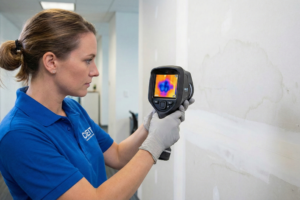
The Effects of IAQ for Occupants in Heavily Occupied Locations
In today’s bustling world, the quality of air in densely populated spaces like offices, schools, and commercial buildings plays a pivotal role in the health and well-being of its occupants. Indoor Air Quality (IAQ) in such locations is influenced by various factors, and its impact is far-reaching.
Understanding the Impacts of IAQ in High Occupancy Areas
1. Health Implications: Poor IAQ can lead to immediate health concerns like headaches, dizziness, and fatigue. Over time, prolonged exposure to poor air quality can contribute to more serious conditions, including respiratory diseases and cardiovascular problems.
2. Productivity and Comfort: In workplaces and educational settings, IAQ directly impacts cognitive functions, concentration, and overall comfort, affecting productivity and learning efficiency.
3. Spread of Airborne Diseases: In heavily populated environments, the risk of airborne diseases increases. Good IAQ management can help reduce this risk significantly.
IAQ Management in Heavily Occupied Locations
To effectively manage IAQ in these environments, the role of certified IAQ professionals becomes crucial.
- For Air Quality Assessment and Improvement: Professionals with a Certified Indoor Air Quality Testing Technician (CIAQTT) certification can accurately assess air quality and suggest improvements.
- In Addressing Specific Pollutants: Certified Mold Inspection Technicians (CMIT) and Certified Mold Remediation Technicians (CMRT) play a key role in identifying and mitigating mold-related issues, a common concern in densely occupied spaces.
- For HVAC System Maintenance: Certified Air Duct Cleaning Technicians (CADCT) ensure the HVAC systems, crucial in regulating IAQ, are functioning optimally.
External Resources for Further Information:
- U.S. Environmental Protection Agency – Indoor Air Quality in High Occupancy Buildings
- World Health Organization – Guidelines for Indoor Air Quality
These external links offer additional insights into IAQ management in high occupancy areas from reputable global and national health organizations.
Conclusion
The quality of indoor air in heavily occupied locations is a significant concern that requires diligent management. Through the expertise of IAQ-certified professionals, the challenges posed by indoor air pollutants can be effectively addressed, ensuring healthier environments for all occupants.



